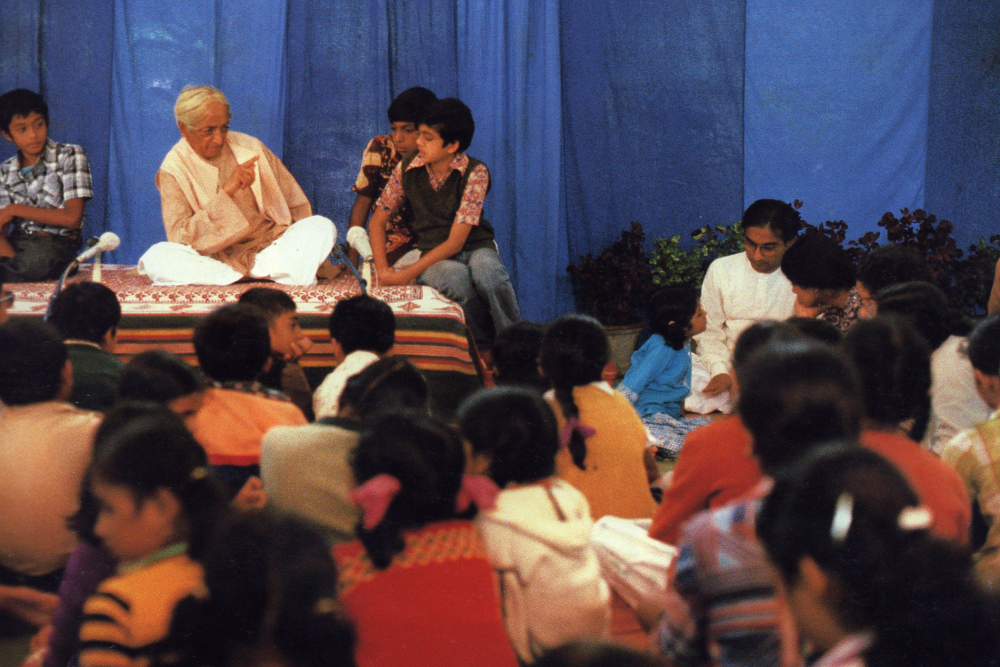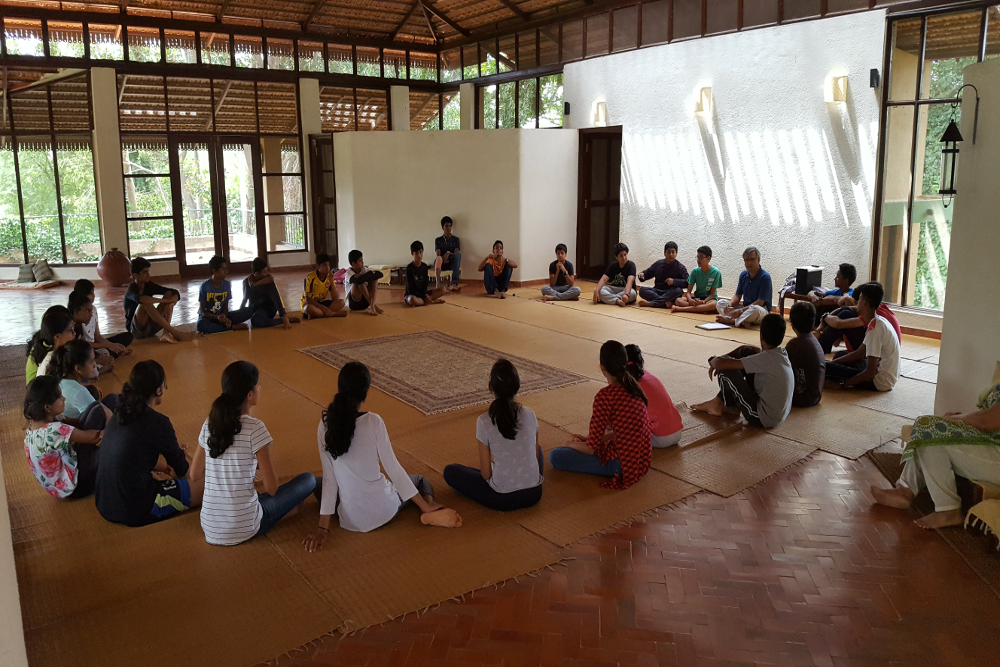

The Study Centre, Bangalore at Haridvanam has been created, based on J. Krishnamurti’s vision. The Study Centre provides an atmosphere of reflection and inquiry into a deep study of the Teachings.
The Study is placed in a quiet side of the Valley, a lush green land of 100 acres. Set in a place of great natural beauty and silence, the Study offers a simple and austere way of living for seekers of truth.
The Study is an integral part of the Bangalore Education Centre having close links with The Valley School. The Study Centre has an eclectic collection of books in the library and DVD collection of J. Krishnamurti’s talks and dialogues.There is no instructor or schedule to follow. One may spend time in individual retreat, listening to sounds of nature, sitting quietly by oneself or going for leisurely nature walk. Regular organized retreats, gatherings, and education seminars are arranged throughout the year. The Study Centre engages actively with the Valley School by offering a regular children programs, teacher retreats, and parent interactions throughout the year.
The study provides furnished cottages with attached bath. The dining hall offers meals. One can engage in informal conversations in the dining lounge with like-minded people.
On these pages you will find information on the intention, facilities, and numerous programs of the Study Centre.
The Valley School"Studying means to go deeply into the subtleties of the words used and their contents and seeing the truth in them in relation to daily life." - J.Krishnamurti
The Study is placed in a quiet side of the Valley, a lush green land of 100 acres. It is located 25 kilometers from Bangalore City and is a veritable oasis of beauty as are other centres of the Krishnamurti Foundation. In it, is a tranquility and silence that is conducive to an inquiring mind. Besides ‘The Study’, there is ‘The Valley School’, which is a day boarding school with 350 students.
The Study is an integral part of the Bangalore Education Centre having close links with the School. It came into existence as a Study Centre after Krishnaji's death in 1986 and now houses a library of books and several well equipped & tastefully designed rooms where one can watch videos, hold serious discussions or simply be quiet. Most of Krishnaji’s audio CDs, VCDs, and DVDs are available in the library and there are regular programmes and dialogues. There is no instructor or schedule. One may spend time in retreat or listening or sitting quietly by oneself. Regular workshops, gatherings, and seminars are arranged throughout the year.
The Krishnamurti Study Centres in India and abroad are based on the vision of J. Krishnamurti and the statements he made about his own teachings. During the early part of his life and work, Krishnamurti founded schools with the aim of bringing about a new kind of education. However, a few years before his death in 1986, he began talking to the trustees of the Foundations about the possibility of doing something beyond what had been done for the young in the schools. He felt that there were many people who, because of the distractions of occupations, family, or other factors in their lives, found it difficult to spare time to look into their own lives.
Read More

Krishnamurti once said, "Education in the true sense is helping the individual to be mature and free, to flower greatly in love and goodness". It is to work towards such an objective that the Krishnamurti schools were started under the aegis of the Krishnamurti Foundation India (KFI). The KFI was set up in 1928 as a religious, charitable and educational institution to carry on humanitarian work in the light of Krishnamurti's teachings. The activities of the Foundation also include cultural and environmental work, publishing, research, rural education and healthcare.
There are now four Krishnamurti Foundations - one each in India, the USA, England, and Latin America. The KFI runs six Education Centres in India - The Rishi Valley in Andhra Pradesh; Rajghat in Varanasi, Uttar Pradesh; the Bangalore Education Centre (BEC), Karnataka; Vasant Vihar/The School in Chennai, Tamil Nadu; Nachiket near Dunda, Uttaranchal and Sahyadri near Pune, Maharashtra.
Of these, the Bangalore Education Centre consists of the Valley School (opened in 1978 with a few students), the Study Centre, and the Art Village. The property, in all measuring about 100 acres, has a lake, a stream and many trees - both natural & cultivated. It is located just off the Kanakapura Road, some 17 kilometers south west of Bangalore city in the state of Karnataka. It is a semi-wilderness haven, as well as an educational institution. The school estate, spread out over an east-west axis, consists of the main school near the centre, an office block, the high school building housing a library holding more than 12000 titles, the junior school block, a science block, an amphitheatre, an assembly hall and a dining hall. The Study Centre is located on the south-west side of the property.
As I see it, a Study Centre has become a necessity because that is the place where the treasure is right? The treasure. From that treasure you can draw. You understand? You can draw your strength, you can draw your energy, you can draw your sustenance, nourishment, and so on. Schools have their limitations, right? Here – I don’t know how to put it – here is something that is sacred; let’s call it for the moment. And from that everything flows.
(Rishi Valley, 19 December 1985)
The person who taught the teachings is unimportant. The teachings are important, and the teachings cover the whole field of life.
(Ojai, 20 March 1977)
The ‘teachings’ are not something out there in a book. What the teaching is or says, ‘Look at yourself, go into yourself, inquire into what there is, understand it, go beyond it’, and so on. You are not to understand the teachings; you are to understand yourself. The teachings are only a means of pointing, of explaining, not the teachings but the understanding of yourselves. Do not try to understand what the speaker says, but understand that what he says acts as a mirror in which you look at yourself. When you look at yourself very carefully, then the mirror will not be important; you will be able to throw it away.
(Rajghat, 25 November 1981)
Questioner: Sir, I wanted to ask you about the proposed Study and what it means to study the teachings.
Krishnamurti: If I went to the Study, first of all I would want to be quiet, not bring problems there - not my household problems, business preoccupations, and so on. And also I think I would want what K says to be entirely part of my life, not just that I have studied K and I repeat what he says. Rather, in the very studying of it, I am really absorbing it, not bits of it here and there, not only just what suits me….
If I went there to study what K is saying, I would want to investigate it, question it, doubt it; not just read something and then go away. I would be reading, not just to memorize; I would be reading to learn, to see what he is saying and my reactions to it, whether it corresponds or contradicts, whether he is right or I am right, so that there is constant communication and interchange between what I am reading and what I am feeling. I would want to establish a relationship between what I am reading, seeing, hearing and myself with my reactions, conditioning, and so on - a dialogue between him and me. Such a dialogue must inevitably bring about a fundamental change.
Let us say that a man like you comes to this Study. You take all the trouble to come to this place, and for the first few days you may want to be quiet. If you are sensitive, you realize there is something here which is different from your home, totally different from going to a discussion somewhere. Then you begin to study; and not only you but all the people living here are studying, seeing, questioning. And everyone actually listening with their whole being will naturally bring about a religious atmosphere.
That is what I would want if I went there. I would be sensitive enough to quickly capture what K is saying. And at lunch, or while walking or sitting around together in the sitting room, I might like to discuss. I might say, ‘Look, I didn’t understand what he meant by that, let’s talk about it.’ Not ‘You tell me about it’, or ‘I know better’ – ‘Let’s go into it’; so it will be a living thing.
(Brockwood Park, England, Undated)
And I think it is essential sometimes to go to retreat, to stop everything that you have been doing, to stop your beliefs and experiences completely and look at them anew, not keep on repeating like machines whether you believe or do not believe. You would then let in fresh air into your minds. Wouldn’t you? That means you must be insecure, must you not? If you can do so, you would be open to the mysteries of nature and to things that are whispering about us, which you would not otherwise reach; you would reach the God that is waiting to come, the truth that cannot be invited but comes itself.
(Madras, 5 January 1952)